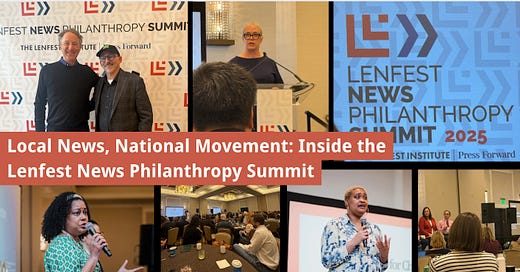Local News, A National Movement: Inside the Lenfest News Philanthropy Summit
In a packed Philadelphia auditorium, more than 300 journalists, fundraisers, and civic leaders gathered not to celebrate a breaking scoop or a Pulitzer Prize, but to do something even more radical: fund the future of local news.
Hosted by the Lenfest Institute for Journalism and the Press Forward coalition, the first-ever in-person summit dedicated solely to local news fundraising wasn’t just a conference. It was a declaration: journalism is essential infrastructure, and the people sustaining it deserve resources, recognition, and respect.
From Every State, a Story
“We’ve now got over 90 funders in the coalition,” one speaker announced. “Last year alone, more than $200 million was invested in local journalism — and that money went into every single state.”
The numbers tell a story of momentum. Press Forward chapters are now active in 30 states, with 40 total chapters nationwide. Some raised nearly $40 million just last year on their own. That kind of decentralized organizing isn’t just impressive — it’s strategic. Local news needs local champions.
One chapter leader said it simply: “We want to advertise in the real newspapers.”
Journalism as a Civic Necessity
A central message of the summit was that local journalism isn’t a niche cause or a vanity project for old media nostalgics — it’s a public good. Like libraries, schools, and hospitals, journalism helps communities function. It informs. It investigates. It connects people who might otherwise be invisible to each other.
The goal, as several speakers noted, is to shift how we talk about journalism — not as a dying business, but as an essential service worth sustaining.
One panel tackled that messaging challenge head-on: what language actually convinces people to support local journalism? Which stories resonate? That research, set to be released this summer, aims to give fundraisers sharper tools to build lasting relationships.
A Keynote with Heart
Mallory Mitchell took the stage to reflect on her early days as a teenage reporter in a tiny Alabama town. Armed with a folder of high school clippings and a determination to write, she convinced the local paper to let her cover stories. That paper, she said, gave her more than a byline — it gave her a sense of self.
“Local journalism is a home for our stories — stories written by us, for us,” she said. Her reflections weren’t just personal. They reminded everyone in the room why this work matters: because local news doesn’t just tell stories. It makes belonging possible.
Legal Armor for Journalistic Courage
The Reporters Committee for Freedom of the Press led one of the summit’s most sobering but urgent discussions: the legal minefield small newsrooms face when tackling high-stakes investigations. Whether it’s FOIA requests, defamation threats, or pre-publication review, access to legal support can make or break a story.
One editor recounted a case of police misconduct uncovered only because their newsroom had access to a pro bono attorney. “We wouldn’t have gotten it published otherwise,” they said.
Legal help isn’t just defense. It’s confidence. It’s what lets newsrooms take risks, push back, and speak truth to power — especially when they’re the only ones left doing it.
A New Kind of Summit
What made this summit different wasn’t just the turnout or the quality of the sessions (though both were strong). It was the tone. This was not a room of mourners reflecting on what journalism used to be. It was a room of builders — people hammering together something better.
Workshops covered everything from donor-advised funds and board engagement to narrative framing and collaborative fundraising models. And unlike many media gatherings, there was no hierarchy between the newsroom and the development team. Here, fundraising wasn’t the thing you do after the story — it was part of the story.
A Movement, Not Just a Moment
This summit made clear that something bigger is happening: local journalism is organizing. It’s coalescing around shared values, common threats, and a deep belief in its public mission.
As one funder said, “You raise money the same way you raise consciousness — by showing up, again and again, and telling people this matters.”
And it does matter. Especially now. When misinformation spreads faster than facts, and trusted local sources are shrinking by the week, the work of building resilient, community-rooted journalism is more than noble. It’s necessary.
In 2025, saving local news isn’t a media story. It’s a civic one. And in Philadelphia, for two hopeful, urgent days, that civic story got a room full of authors — ready to write the next chapter.




